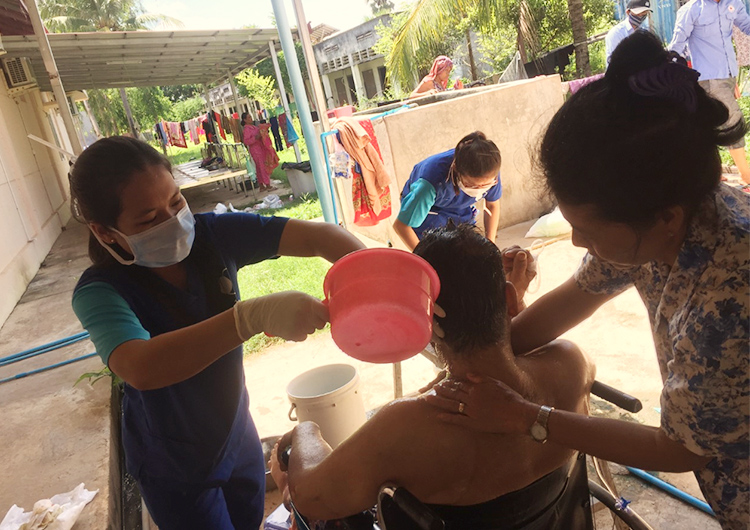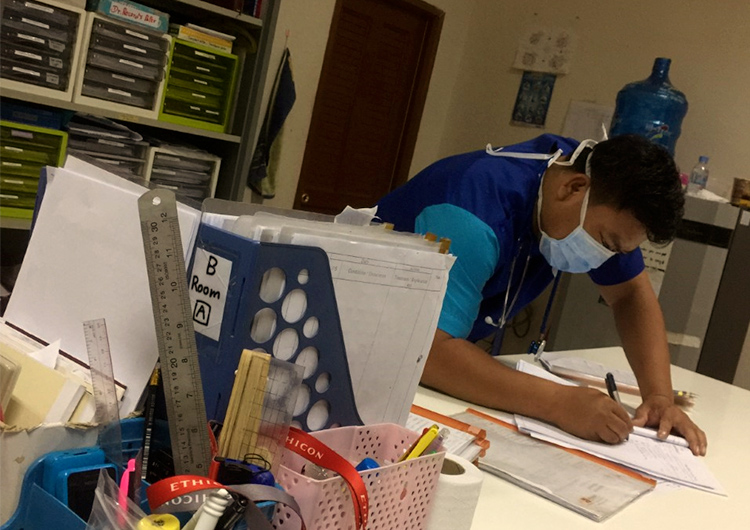Someone once told me “International cooperation is about facing your own weaknesses”. Recently I realized the truth of this statement and I would like to continue overcoming that challenge.
This isn’t a story about myself, but a story of colleagues who continually treat patients despite their own weaknesses. I have many colleagues that I really respect, but I particularly want to talk about the new nurses I began working with in January after I returned to Cambodia. This is a story about some of my reliable Cambodian colleagues.
Thinking about what it was like at first, there were many situations where the patient’s care and treatment were critical and this often made me nervous. Of course, this still happens now, but I can witness the evidence of their professional growth.
I am also overbearing when it comes to helping patients, so there are times when I really want to interfere with their work. I also want my trainees to learn by observing me, so I myself tend to give it my all when I take care of patients. However, I understand that it is really important to leave it to them while watching over them up until the moment that things could get dangerous or when follow-up is necessary. I myself am still in the middle of improving my skills with regard to that. My story aside, let me tell you about three times that I felt the growth of the new nurses.
First, they can offer their opinions
“I think that this is the best treatment for the patient for this reason, so what should we do?” Or “I think that the patient’s symptoms are occurring for this reason, so I would like to do this. What do you think?” I believe that being able to independently think about one’s own opinions and needs in this way shows huge growth. Of course, being able to apply an IV drip or treat wounds skilfully is also a sign of huge growth. Some things grow naturally as you gain experience. But it is not just about doing their jobs. I have learned from them that growth in one’s work cannot occur if you don’t think consciously about what you are doing.

Second, they can now ask about things that they don’t understand instead of leaving them as they are.
Naturally, it is easier said than done. For better or worse, our actions have a great impact on our patients.
What I find challenging and interesting about working as a nurse is looking after the patient in front of me. Unclear knowledge and the inappropriate action has a direct effect on these people’s lifespans and their life in general is also affected. It is an immense responsibility and it is dangerous to proceed bluntly based only on assumptions without also considering uncertainty and anxiety around the reasons behind the care being given.
It is often difficult for people to ask things they don’t know. It is generally uneasy to face one’s own anxieties and lack of self-confidence. However, if you can be aware of your own shortcomings, and focus on the patients in front of you, the understanding of what to do will come naturally.
The trainees want the patients to be healthy and don’t want their conditions to worsen. Now that they can ask about things I feel it leads to the benefit of the patient. They always ask me good questions. I frantically update myself every day so I can respond!

Third, they are able to continue to face their own weaknesses which I mentioned at the beginning of this article.
In the process of learning new things and growing as nurses there are sometimes hardships, but I think that the ability to take a step from there and work hard to fill in the gaps in their skills and move forward is amazing. Being patient is important. In this respect, I think that they deal with patients really well.
I realise that “moving forward” is important. Certainly, there comes times when you run into your own lack of power as you move forward, but instead of struggling in this condition, the trainees work together in cooperation with their colleagues. When they work together, they are more than the sum of their parts and when they help patients this way it makes me cry with joy. Because their goal of giving patients the best care is not shaken, each person in the team works together with their colleagues even when each individual lacks strength. Their acting this way convinces me to say that they would be able to overcome any difficulty with their team in the future.
Surgical activities, which had been delayed by the pandemic, restarted in June and the number of patient visits and hospitalisations was high every day. It was under this busy situation that I was most relieved by the trainees’ cooperating culture. Even though each of them has grown in ability, accepting that it is sometimes not enough and moving forward with the cooperation of their friends is wonderful to watch and makes me think everything is ok.
Together with my irreplaceable colleagues, I myself accept my own weaknesses and put my full power into doing my best here.

Eriko Matsumi, Senior Nurse

